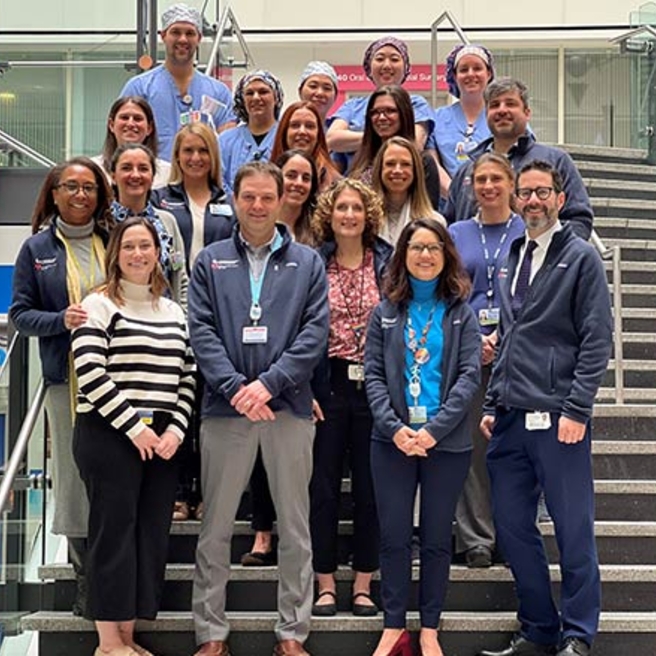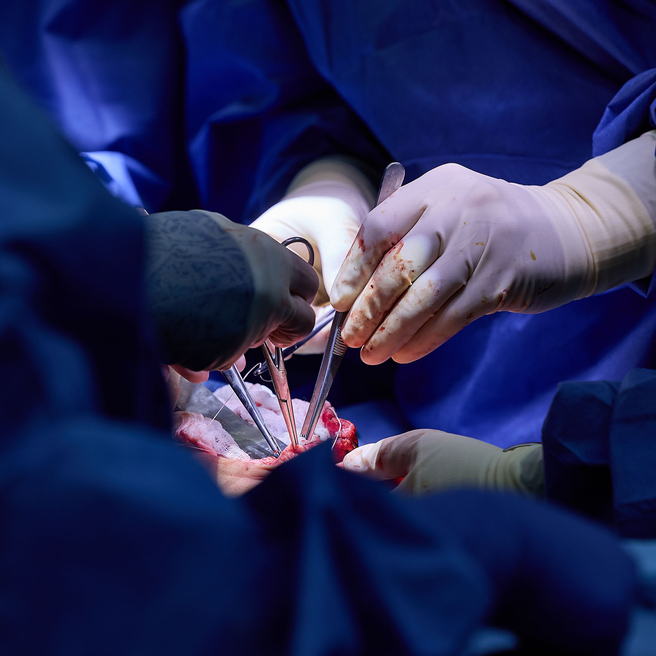Our Kidney Transplant Program recently celebrated completing 500 kidney transplants. Transplant nurse practitioner, Sonya Lopez, RN, MSN, CRNP, has been with the team for all 500 transplants. In this Q-and-A, we delve into Sonya’s inspiring journey over the past 30 years. Join us as we explore her impactful experiences, the changes in medical practices, and her vision for the future of pediatric kidney transplantation.

Q: Can you share your journey to CHOP Nephrology?
A: I grew up in West Philadelphia and attended the public school system. My father worked at the VA hospital as a pathologist technician, a clinician who helps with diagnosing conditions. He’s the reason why I’m working in the medical field. During those times, he was able to bring me to work and I would “hang out” with his colleagues in different areas of medicine (in the lab and with physician and nursing leadership). This is when I noticed a difference in how doctors and nurses interact with patients, and the vital role nurses play in supporting families.
I attended the University of Pittsburgh (Pitt) for nursing school and always envisioned returning to Philadelphia to work. My clinicals at Pitt sparked an interest in initially working in maternity or pediatrics. “Clinicals" are hands-on, real-world training experiences where nursing students apply what they're learning in the classroom to practice skills. I returned to the Philadelphia area because there weren’t many nurses who looked like me, so I wanted to be a role model for others from my background. I wanted to show that you can grow up in West Philadelphia and go on to be many things.
When I graduated, I applied to two jobs: one in pediatrics at CHOP, and the other in labor and delivery at Pennsylvania Hospital. CHOP hired me, so I started my career there. I also had a personal connection to CHOP, as I had a minor procedure there once as a kid.
Q: How has your role evolved over time?
A: I started as a staff nurse. This means I was part of a team of nurses providing care to hospitalized patients. As a staff nurse, I worked on the surgical floor where I cared for patients after surgical procedures from ENT, Orthopedics, Neurosurgery, General Surgery, and Transplant Surgery (liver, kidney and kidney donors). I gave medications, monitored the patient’s recovery and reinforced the care team’s goals. This was my initial exposure to transplant surgery. I also worked in Hematology as their research nurse for sickle cell patients receiving hydroxyurea therapy.
Eventually, I went back to school and got my master’s degree at Penn to be an acute chronic pediatric nurse practitioner. This is a registered nurse with advanced education and training. Nurse practitioners can diagnose and treat medical conditions, prescribe medications, provide preventative care, and manage chronic illnesses. They often work independently or alongside physicians.
After graduating, I accepted a nurse practitioner position in Nephrology working on the outpatient side of things. This means I cared for patients who received medical management in clinic, rather than those admitted to the hospital.
Initially, I provided continuity of care for families whose children had chronic kidney disease and would eventually need a transplant. I eventually transitioned to the kidney transplant team, where I would guide families through every step of the transplant process and medically managed the recipient post-transplantation. I’m the clinician they see most consistently in clinic, so I develop really strong bonds with them, because when patients come to us, they stay with us for 10, 15, sometimes 20 years. We are a multidisciplinary team, so we work closely to educate and support families, addressing both medical and emotional needs.
Q: How has the process of kidney transplants changed from your first patient to the 500th?
A: Medicine has advanced significantly, for donors and for patients. Initially, donor surgeries were done at CHOP, but now they are performed next door at the Hospital of the University of Pennsylvania (HUP). The understanding of donor care has expanded as well. Years ago, donor surgery was an open procedure requiring longer hospital stays. Now, we can do the procedure laparoscopically (based on donor anatomy). This is a minimally invasive surgical technique using small incisions in the body. It results in quicker recovery and less scarring compared to open surgery. The criteria for who can be a donor have also broadened; insurance coverage now includes more than just parents. Social media has been a game changer on how families have access to donors. For recipients, medical management has changed regarding maintenance and rejection therapy. These patients are spending less time in the hospital.
Q: What improvements have you seen in patient care and outcomes over the years?
A: Genetic testing and pre-transplant match testing allow us to be more granular on seeing how well the recipient and donor match. This information gives us the ability to minimize rejection and lower immunosuppression as much as possible. Rejection medications have also improved substantially. Rejection medications are drugs that stop the body from rejecting a transplanted organ. They are also called immunosuppressants.
Early anti-rejection medications had severe side effects, affecting patient appearance and quality of life. Now, we have better options, although there’s still work to be done in personalizing treatment plans for individual patients.
Q: Can you describe the role of CHOP's multidisciplinary care team in the kidney transplant process?
A: Our multidisciplinary team brings diverse expertise to the table, allowing us to tailor care to each patient’s unique needs. Team members focus on different specialties, enhancing our ability to provide individualized pre- and post-transplant care. This collaborative approach has grown from a small core group to a more extensive network of specialists (physician, advanced practice provider, social worker, nutritionist, pharmacist, psychologist, surgeon, transplant coordinator and infectious disease specialist).
Q: What have been some of the most memorable experiences you've had while caring for kidney transplant patients?
A: When I came to CHOP, I never envisioned I’d be here for 30 years and be part of so many patients’ and families’ lives. Celebrating our 500th transplant was a profound moment. I helped organize a special event to celebrate this milestone at the Philadelphia Zoo in September 2024. It was a beautiful, emotional and special day that drew 600 or so people, including current and former patients and their families, and current and former staff members, physicians and surgeons.
I am incredibly grateful to have seen so many patients, families and staff at the event. It was emotional to see how far they’ve come and to hear their stories. The overwhelming response means the world to me and truly highlights the strength of the relationships made with our current and past patients.
During the event, my colleagues gave me a memory book they made filled with messages from families I’ve cared for over the years. When you have conversations with families in the care setting, you never know how you impact them or if what you say makes a difference. This book made me realize the impact I’ve had on their lives.
Q: What advice would you give to new nurse practitioners entering the field of nephrology?
A: The sky's the limit! There are numerous opportunities in nursing, from research to leadership roles. Don’t limit yourself; explore various paths and embrace growth and challenges in your career.
Q: How do you think advancements in technology will impact kidney transplant procedures in the future?
A: I hope that one day transplantation will be unnecessary due to advancements in correcting the abnormality early in the diagnostic period. Until then, we are seeing advancements in disease treatments, expansion in nutrition initiatives, public health policies in place, and interest in xenotransplants, 3D-printed organs and gene therapy. The goal is to identify and treat kidney issues early, reducing the need for transplants, and to personalize post-transplant care.
Q: What is your vision for the future of nephrology and kidney transplants at CHOP?
A: I want the program to continue growing and to provide top-level, equitable care for all patients. For the 500th celebration, I initiated a fund to support our young adults with their transition to adult medicine. This fund will help by providing services and programming within the transplant program. Some things it will cover include career planning and education sessions for patients/families. My goal is to help them envision their futures after transplant. When you first learn your child needs a kidney transplant, you’re just thinking about the now. Families aren’t thinking about the future. This fund will help families think beyond immediate needs and consider their child’s long-term goals.
Featured in this article
Specialties & Programs
Our Kidney Transplant Program recently celebrated completing 500 kidney transplants. Transplant nurse practitioner, Sonya Lopez, RN, MSN, CRNP, has been with the team for all 500 transplants. In this Q-and-A, we delve into Sonya’s inspiring journey over the past 30 years. Join us as we explore her impactful experiences, the changes in medical practices, and her vision for the future of pediatric kidney transplantation.

Q: Can you share your journey to CHOP Nephrology?
A: I grew up in West Philadelphia and attended the public school system. My father worked at the VA hospital as a pathologist technician, a clinician who helps with diagnosing conditions. He’s the reason why I’m working in the medical field. During those times, he was able to bring me to work and I would “hang out” with his colleagues in different areas of medicine (in the lab and with physician and nursing leadership). This is when I noticed a difference in how doctors and nurses interact with patients, and the vital role nurses play in supporting families.
I attended the University of Pittsburgh (Pitt) for nursing school and always envisioned returning to Philadelphia to work. My clinicals at Pitt sparked an interest in initially working in maternity or pediatrics. “Clinicals" are hands-on, real-world training experiences where nursing students apply what they're learning in the classroom to practice skills. I returned to the Philadelphia area because there weren’t many nurses who looked like me, so I wanted to be a role model for others from my background. I wanted to show that you can grow up in West Philadelphia and go on to be many things.
When I graduated, I applied to two jobs: one in pediatrics at CHOP, and the other in labor and delivery at Pennsylvania Hospital. CHOP hired me, so I started my career there. I also had a personal connection to CHOP, as I had a minor procedure there once as a kid.
Q: How has your role evolved over time?
A: I started as a staff nurse. This means I was part of a team of nurses providing care to hospitalized patients. As a staff nurse, I worked on the surgical floor where I cared for patients after surgical procedures from ENT, Orthopedics, Neurosurgery, General Surgery, and Transplant Surgery (liver, kidney and kidney donors). I gave medications, monitored the patient’s recovery and reinforced the care team’s goals. This was my initial exposure to transplant surgery. I also worked in Hematology as their research nurse for sickle cell patients receiving hydroxyurea therapy.
Eventually, I went back to school and got my master’s degree at Penn to be an acute chronic pediatric nurse practitioner. This is a registered nurse with advanced education and training. Nurse practitioners can diagnose and treat medical conditions, prescribe medications, provide preventative care, and manage chronic illnesses. They often work independently or alongside physicians.
After graduating, I accepted a nurse practitioner position in Nephrology working on the outpatient side of things. This means I cared for patients who received medical management in clinic, rather than those admitted to the hospital.
Initially, I provided continuity of care for families whose children had chronic kidney disease and would eventually need a transplant. I eventually transitioned to the kidney transplant team, where I would guide families through every step of the transplant process and medically managed the recipient post-transplantation. I’m the clinician they see most consistently in clinic, so I develop really strong bonds with them, because when patients come to us, they stay with us for 10, 15, sometimes 20 years. We are a multidisciplinary team, so we work closely to educate and support families, addressing both medical and emotional needs.
Q: How has the process of kidney transplants changed from your first patient to the 500th?
A: Medicine has advanced significantly, for donors and for patients. Initially, donor surgeries were done at CHOP, but now they are performed next door at the Hospital of the University of Pennsylvania (HUP). The understanding of donor care has expanded as well. Years ago, donor surgery was an open procedure requiring longer hospital stays. Now, we can do the procedure laparoscopically (based on donor anatomy). This is a minimally invasive surgical technique using small incisions in the body. It results in quicker recovery and less scarring compared to open surgery. The criteria for who can be a donor have also broadened; insurance coverage now includes more than just parents. Social media has been a game changer on how families have access to donors. For recipients, medical management has changed regarding maintenance and rejection therapy. These patients are spending less time in the hospital.
Q: What improvements have you seen in patient care and outcomes over the years?
A: Genetic testing and pre-transplant match testing allow us to be more granular on seeing how well the recipient and donor match. This information gives us the ability to minimize rejection and lower immunosuppression as much as possible. Rejection medications have also improved substantially. Rejection medications are drugs that stop the body from rejecting a transplanted organ. They are also called immunosuppressants.
Early anti-rejection medications had severe side effects, affecting patient appearance and quality of life. Now, we have better options, although there’s still work to be done in personalizing treatment plans for individual patients.
Q: Can you describe the role of CHOP's multidisciplinary care team in the kidney transplant process?
A: Our multidisciplinary team brings diverse expertise to the table, allowing us to tailor care to each patient’s unique needs. Team members focus on different specialties, enhancing our ability to provide individualized pre- and post-transplant care. This collaborative approach has grown from a small core group to a more extensive network of specialists (physician, advanced practice provider, social worker, nutritionist, pharmacist, psychologist, surgeon, transplant coordinator and infectious disease specialist).
Q: What have been some of the most memorable experiences you've had while caring for kidney transplant patients?
A: When I came to CHOP, I never envisioned I’d be here for 30 years and be part of so many patients’ and families’ lives. Celebrating our 500th transplant was a profound moment. I helped organize a special event to celebrate this milestone at the Philadelphia Zoo in September 2024. It was a beautiful, emotional and special day that drew 600 or so people, including current and former patients and their families, and current and former staff members, physicians and surgeons.
I am incredibly grateful to have seen so many patients, families and staff at the event. It was emotional to see how far they’ve come and to hear their stories. The overwhelming response means the world to me and truly highlights the strength of the relationships made with our current and past patients.
During the event, my colleagues gave me a memory book they made filled with messages from families I’ve cared for over the years. When you have conversations with families in the care setting, you never know how you impact them or if what you say makes a difference. This book made me realize the impact I’ve had on their lives.
Q: What advice would you give to new nurse practitioners entering the field of nephrology?
A: The sky's the limit! There are numerous opportunities in nursing, from research to leadership roles. Don’t limit yourself; explore various paths and embrace growth and challenges in your career.
Q: How do you think advancements in technology will impact kidney transplant procedures in the future?
A: I hope that one day transplantation will be unnecessary due to advancements in correcting the abnormality early in the diagnostic period. Until then, we are seeing advancements in disease treatments, expansion in nutrition initiatives, public health policies in place, and interest in xenotransplants, 3D-printed organs and gene therapy. The goal is to identify and treat kidney issues early, reducing the need for transplants, and to personalize post-transplant care.
Q: What is your vision for the future of nephrology and kidney transplants at CHOP?
A: I want the program to continue growing and to provide top-level, equitable care for all patients. For the 500th celebration, I initiated a fund to support our young adults with their transition to adult medicine. This fund will help by providing services and programming within the transplant program. Some things it will cover include career planning and education sessions for patients/families. My goal is to help them envision their futures after transplant. When you first learn your child needs a kidney transplant, you’re just thinking about the now. Families aren’t thinking about the future. This fund will help families think beyond immediate needs and consider their child’s long-term goals.
Recommended reading
CHOP Celebrates Milestone 500 Kidney Transplants

Our Kidney Transplant Program recently achieved an important milestone: 500 kidney transplants!
CHOP performs record setting living donor kidney transplants in a fiscal year

CHOP credits the milestone in part to its involvement with the National Kidney Registry through a partnership with the Penn Medicine, which provides CHOP access to a large pool of potential living kidney donors.
Contact us
Division of Nephrology